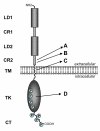The oncogene HER2: its signaling and transforming functions and its role in human cancer pathogenesis
- PMID: 17471238
- PMCID: PMC3021475
- DOI: 10.1038/sj.onc.1210477
The oncogene HER2: its signaling and transforming functions and its role in human cancer pathogenesis
Abstract
The year 2007 marks exactly two decades since Human Epidermal Growth Factor Receptor-2 (HER2) was functionally implicated in the pathogenesis of human breast cancer. This finding established the HER2 oncogene hypothesis for the development of some human cancers. The subsequent two decades have brought about an explosion of information about the biology of HER2 and the HER family. An abundance of experimental evidence now solidly supports the HER2 oncogene hypothesis and etiologically links amplification of the HER2 gene locus with human cancer pathogenesis. The molecular mechanisms underlying HER2 tumorigenesis appear to be complex and a unified mechanistic model of HER2-induced transformation has not emerged. Numerous hypotheses implicating diverse transforming pathways have been proposed and are individually supported by experimental models and HER2 may indeed induce cell transformation through multiple mechanisms. Here I review the evidence supporting the oncogenic function of HER2, the mechanisms that are felt to mediate its oncogenic functions, and the evidence that links the experimental evidence with human cancer pathogenesis.
Figures




References
-
- Ahnstrom M, Nordenskjold B, Rutqvist LE, Skoog L, Stal O. Role of cyclin D1 in ErbB2-positive breast cancer and tamoxifen resistance. Breast Cancer Res Treat. 2005;91:145–151. - PubMed
-
- Akiyama T, Sudo C, Ogawara H, Toyoshima K, Yamamoto T. The product of the human c-erbB-2 gene: a 185-kilodalton glycoprotein with tyrosine kinase activity. Science. 1986;232:1644–1646. - PubMed
-
- Alimandi M, Romano A, Curia MC, Muraro R, Fedi P, Aaronson SA, et al. Cooperative signaling of ErbB3 and ErbB2 in neoplastic transformation and human mammary carcinomas. Oncogene. 1995;10:1813–1821. - PubMed
-
- Alpy F, Tomasetto C. MLN64 and MENTHO, two mediators of endosomal cholesterol transport. Biochem Soc Trans. 2006;34:343–345. - PubMed
-
- Amundadottir LT, Leder P. Signal transduction pathways activated and required for mammary carcinogenesis in response to specific oncogenes. Oncogene. 1998;16:737–746. - PubMed
Publication types
MeSH terms
Substances
Grants and funding
LinkOut - more resources
Full Text Sources
Other Literature Sources
Medical
Research Materials
Miscellaneous

